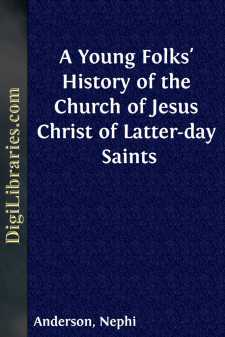Categories
- Antiques & Collectibles 13
- Architecture 36
- Art 48
- Bibles 22
- Biography & Autobiography 815
- Body, Mind & Spirit 144
- Business & Economics 28
- Children's Books 18
- Children's Fiction 14
- Computers 4
- Cooking 94
- Crafts & Hobbies 4
- Drama 346
- Education 58
- Family & Relationships 59
- Fiction 11833
- Games 19
- Gardening 17
- Health & Fitness 34
- History 1378
- House & Home 1
- Humor 147
- Juvenile Fiction 1873
- Juvenile Nonfiction 202
- Language Arts & Disciplines 89
- Law 16
- Literary Collections 686
- Literary Criticism 179
- Mathematics 13
- Medical 41
- Music 40
- Nature 179
- Non-Classifiable 1768
- Performing Arts 7
- Periodicals 1453
- Philosophy 65
- Photography 2
- Poetry 896
- Political Science 203
- Psychology 44
- Reference 154
- Religion 515
- Science 126
- Self-Help 85
- Social Science 82
- Sports & Recreation 34
- Study Aids 3
- Technology & Engineering 59
- Transportation 23
- Travel 463
- True Crime 29
Nephi Anderson
Nephi Anderson was a prominent early 20th-century author known for his contributions to Latter-day Saint literature. Born in Norway in 1865, he immigrated to the United States and became a well-known figure in Mormon fiction. His most famous work is "Added Upon" (1898), which explores themes of eternal progression and the afterlife, and it remains a significant piece of LDS literature. Anderson wrote several other novels, such as "Dorian" and "The Story of Chester Lawrence," blending religious themes with romantic and moral narratives.
Author's Books:
Sort by:
by:
Nephi Anderson
To Parents and Teachers. Studying the history of our country creates patriotism and engenders loyalty. For the same reason, a study of the history of the Church of Jesus Christ of Latter-day Saints will implant in our boys and girls a love for its heroes, a loyalty to its principles, and an appreciation of its achievements. By a knowledge of the history of the Church, our young people will prize more...
more...
by:
Nephi Anderson
CHAPTER ONE. Dorian Trent was going to town to buy himself a pair of shoes. He had some other errands to perform for himself and his mother, but the reason for his going to town was the imperative need of shoes. It was Friday afternoon. The coming Sunday he must appear decently shod, so his mother had told him, at the same time hinting at some other than the Sunday reason. He now had the money, three...
more...
by:
Nephi Anderson
PART FIRST. "The Lord possessed me in the beginning of his way, before his works of old. "I was set up from everlasting, from the beginning, or ever the earth was. "When there were no depths, I was brought forth; when there were no fountains abounding with water. "Before the mountains were settled, before the hills was I brought forth: "While as yet he had not made the earth, nor...
more...
by:
Nephi Anderson
CHAPTER I. It was raining when the ship was ready to sail; yet on the pier a large crowd of people stood under dripping umbrellas, waving and shouting farewells to their friends on board. The departing passengers, most of them protected by an upper deck, pressed four deep against the rail, and waved and shouted in return. The belated passenger, struggling with heavy hand baggage, scrambled up the...
more...





